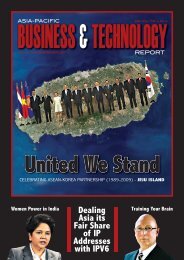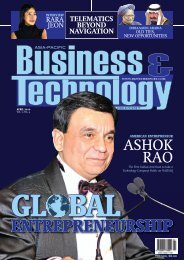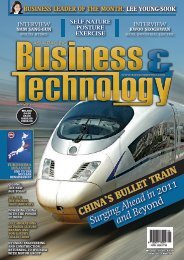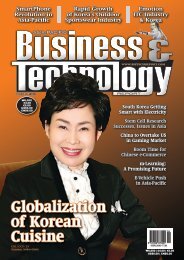GreeN Growth - Asia-Pacific Business and Technology Report
GreeN Growth - Asia-Pacific Business and Technology Report
GreeN Growth - Asia-Pacific Business and Technology Report
- No tags were found...
You also want an ePaper? Increase the reach of your titles
YUMPU automatically turns print PDFs into web optimized ePapers that Google loves.
QaLaurence Brahm:Know Your Sun TzuBY victor ficLaurence Brahm (www.laurencebrahm.com) is a member of the United Nations Theme Group on Poverty<strong>and</strong> Inequality, a global activist, international mediator, lawyer, economist <strong>and</strong> author. He leads the way in advocatinga fresh development paradigm –- The Himalayan Consensus – an innovative approach to development (see www.laurencebrahm.com).With thirty years of experience in <strong>Asia</strong>, including China, Laurence advises global corporations <strong>and</strong> regional governments.He divides his time between Beijing, Lhasa, <strong>and</strong> Dakar. He is also the author of Doing <strong>Business</strong> in China The SunTzu Way. Laurence gave this interview to Victor Fic (vfic@hotmail.com), our special correspondent for business <strong>and</strong> politics.Underst<strong>and</strong>ing Chinese NegotiationLaurence, why is Art of War aclassic that is widely read inpolitics, strategy, <strong>and</strong> the businessworld?It is a philosophy <strong>and</strong> very pragmaticguide to life, whether for business or politics.The book is foremost about war buton a deeper level about strategy which isbroadly applicable to life.Did you translate it yourself?No, I am not a scholar. Instead, I used aChinese text commonly available in bookstoresin China. The best version is byThomas Cleary. As a warning, James Clavel’sversion is lousy. I checked the various translationsagainst the Chinese.What qualifies you to offer adviceabout it?I am a professional negotiator <strong>and</strong> mediatorin China <strong>and</strong> <strong>Asia</strong> -- a three decadeveteran of major multinational take-overs<strong>and</strong> mergers <strong>and</strong> other negotiations, fromdealing with mafia bosses extorting moneyfrom foreign investors to complex, secondtrack mediation between governments. Ipragmatically see how its philosophy <strong>and</strong>ideas apply to life. For academic analysis ofSun Tzu <strong>and</strong> the Warring States Period, consultscholars.You squared off against mafiabosses -- <strong>and</strong> lived?Thuggery is common in China. Duringthe early 1990s, cutting deals for foreignmultinationals was win-win – plenty ofchampagne <strong>and</strong> excitement. By the late1990s, I was restructuring these falteringdeals as foreign investors bought out theirChinese partners or pulled out. By then, Imostly investigated product <strong>and</strong> documentfalsification <strong>and</strong> running funds into multiplebank accounts. One dead board chairmancould not be found – I’ve said enough!That must have disappointed you.I did not want to change from deal makerto criminal investigator. Then the Shanximafia staked out my own private propertyin 2003, but the police only provided hotelrooms <strong>and</strong> body guards while I was lockedinside with the boss for a day negotiatingextortion money for peace. My manager wasnearly beaten to death. Finally, we countedout the cash -- at the police office. This isnormal even for many foreign investors.So when highly-paid analysts in designershirts, ties, <strong>and</strong> cuffs give nice PowerPointpresentations about China -- I just laugh.You insist that the Chinese strikefirst <strong>and</strong> hard, back away, holdthe position <strong>and</strong> never compromise.Provide specific examples.I wrote many books partly to vent thesestories -- read them, please! The bad outweighthe good. Mao taught, “When the enemyis near, I am far; when the enemy runsI pursue; when the enemy is tired, I harass;when the enemy rests, I strike.” For the strategic<strong>and</strong> economic dialogue between China<strong>and</strong> the US, or for a maid who wants a raise,this is the tactic. When she stops cleaning<strong>and</strong> breaks your stuff, she signals you. Foreigninvestors figure out the obvious, repetitivegame. Sun Tzu would admonish themfor losing the element of surprise.Is the Chinese idea that relationshipswith outsiders are basicallyzero sum?All relationships in China entail mutualexploitation. Under Mao, when peoplelacked money <strong>and</strong> commodities, theytraded favors or power. They still do. AndChina today is about money as the zero sumgame. Chinese “friendship” means “we dobusiness on my terms only” or you are nota good friend.Sun Tzu said that all warfare isbased on deception. How doesthis relate to negotiation?All negotiation in China <strong>and</strong> a lot of itelsewhere is based on deception, so howkeen is your perception? What do you actuallyneed? At what price? Intelligence is crucialfor diplomatic <strong>and</strong> commercial negotiations.When you perceive that the otherparty’s bottom line is not its public stance,the game changes <strong>and</strong> you can low ball theprice or commodity exchange. It is all aboutsmoke screens <strong>and</strong> mirrors to get the bestoutcome for yourself.Experts also warn that the Chinesequickly see or sow division<strong>and</strong> play off factions or pitch onegroup against another... is this atactic?Anybody who claims to be a China expertis kidding himself. Even the Chinese cannotentirely underst<strong>and</strong> their complex, changingnation. Yes, Chinese played off factionsthrough their 2,000 year history. The WarringStates <strong>and</strong> Three Kingdoms periods areclassic metaphors for daily politics in anyChinese enterprise or level of government.So find their crack point <strong>and</strong> open up thosechannels. Or they will do that to you!But many Westerners find theChinese will unify against theoutsider <strong>and</strong> conceal or heal theirsplits -- like a wall...They build walls <strong>and</strong> think people cannotintrude. But their weakness is money.The Qings bribed a Ming general to passthrough. As a lawyer, I advise you to nevertake or give a bribe. But as a writer, I willreveal the truth.Sun Tzu said that force is secondbest to peaceful victory -- meaning?Yes, using psychology to wear downyour opponent <strong>and</strong> winning without himrealizing your actions is ideal. But in Chinatoday, brute force is more common. Peopledo combat in factories for a raise <strong>and</strong> in thestreet over a traffic slight. Sun Tzu taughtpatience <strong>and</strong> hiding your emotions!How does it compare to Americanhistory?The State Department should read mybook, stop invading others, <strong>and</strong> use psychologyto attain America’s true interests. ButAmerican culture overly emphasizes scoringpoints to underst<strong>and</strong> a subtle approach.I am doing a speaking tour in Washingtonthis November to think tanks <strong>and</strong> universities.Lets see if they agree or stay focusedon whether or not China will appreciate theRenminbi’s value.Do Chinese judge Westerners <strong>and</strong>especially Americans as weak <strong>and</strong>gullible in talks?They feel superior. Partly it is cultural.China was the middle kingdom. It inventedchopsticks! So leveraging this is natural.Do the Chinese respect the Westas a partner?The Chinese paradoxically disdain <strong>and</strong>respect western culture. But following the2008 crash, with the US economy in decay<strong>and</strong> Europe in debt, many Chinese are confidentthat their system is superior. It’s likethe Emperor Qianlong of the Qing dynastyagain. When the English sought trade ties<strong>and</strong> showed the emperor their manufacturedwares, the Chinese ruler replied thatwe have everything <strong>and</strong> need nothing fromyou! Let us see how sustainable it is.How well is the Chinese way understoodin the West?The West does not underst<strong>and</strong> China<strong>and</strong> vice versa -- equally -- regarding values,goals, <strong>and</strong> means. They look through stereotyped<strong>and</strong> blinkered frames. But far moreyounger Chinese are studying in the West<strong>and</strong> the other way around, so barriers willcontinue to fall.What are the biggest errors thatWestern firms or governmentscommit in negotiations withChina?Being so naive. Timothy Geithner shouldread my book. China’s strategy is “ge anguan huo,” or “observing the fire from theother banks” by smirking at the post-2008Wall Street crisis as signaling the death ofthe Washington Consensus. China feelsmaybe correctly that it has time that theTreasury lacks.Where is the Chinese approachweak?They are not naive. Their one goal is-- money. They have the most. Maybe theyread the book. A-P26 | A-P BUSINESS & TECHNOLOGY REPORT A-P BUSINESS & TECHNOLOGY REPORT | 27









